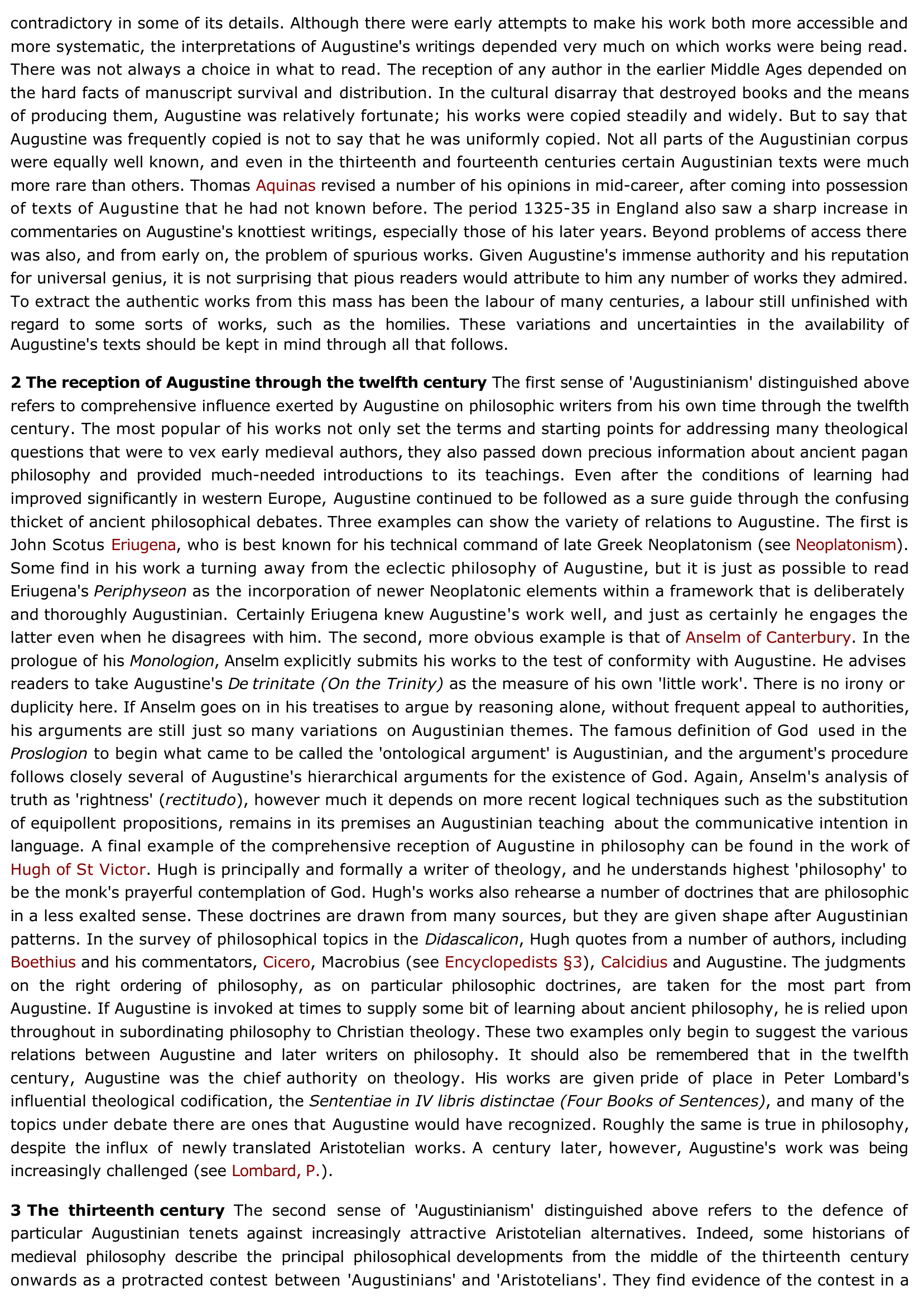Augustinianism
Publié le 22/02/2012

Extrait du document
«
contradictory in some of its details.
Although there were early attempts to make his work both more accessible and more systematic, the interpretations of Augustine 's writings depended very much on which works were being read. There was not always a choice in what to read.
The reception of any author in the earlier Middle Ages depended on the hard facts of manuscript survival and distribution.
In the cultural disarray that destroyed books and the means of producing them, Augustine was relatively fortunate; his works were copied steadily and widely.
But to say that Augustine was frequently copied is not to say that he was uniformly copied.
Not all parts of the Augustinian corpus were equally well known, and even in the thirteenth and fourteenth centuries certain Augustinian texts were much more rare than others.
Thomas Aquinas revised a number of his opinions in mid-career, after coming into possession of texts of Augustine that he had not known before.
The period 1325-35 in England also saw a sharp increase in commentaries on Augustine's knottiest writings, especially those of his later years. Beyond problems of access there was also, and from early on, the problem of spurious works.
Given Augustine's immense authority and his reputation for universal genius, it is not surprising that pious readers would attribute to him any number of works they admired. To extract the authentic works from this mass has been the labour of many centuries, a labour still unfinished with regard to some sorts of works, such as the homilies.
These variations and uncertainties in the availability of Augustine 's texts should be kept in mind through all that follows.
2 The reception of Augustine through the twelfth century The first sense of 'Augustinianism' distinguished above refers to comprehensive influence exerted by Augustine on philosophic writers from his own time through the twelfth century.
The most popular of his works not only set the terms and starting points for addressing many theological questions that were to vex early medieval authors, they also passed down precious information about ancient pagan philosophy and provided much-needed introductions to its teachings.
Even after the conditions of learning had improved significantly in western Europe, Augustine continued to be followed as a sure guide through the confusing thicket of ancient philosophical debates. Three examples can show the variety of relations to Augustine.
The first is John Scotus Eriugena , who is best known for his technical command of late Greek Neoplatonism (see Neoplatonism ). Some find in his work a turning away from the eclectic philosophy of Augustine, but it is just as possible to read Eriugena's Periphyseon as the incorporation of newer Neoplatonic elements within a framework that is deliberately and thoroughly Augustinian. Certainly Eriugena knew Augustine 's work well, and just as certainly he engages the latter even when he disagrees with him. The second, more obvious example is that of Anselm of Canterbury .
In the prologue of his Monologion , Anselm explicitly submits his works to the test of conformity with Augustine.
He advises readers to take Augustine's De trinitate (On the Trinity) as the measure of his own 'little work'.
There is no irony or duplicity here.
If Anselm goes on in his treatises to argue by reasoning alone, without frequent appeal to authorities, his arguments are still just so many variations on Augustinian themes.
The famous definition of God used in the Proslogion to begin what came to be called the 'ontological argument' is Augustinian, and the argument's procedure follows closely several of Augustine's hierarchical arguments for the existence of God.
Again, Anselm's analysis of truth as 'rightness' (rectitudo ), however much it depends on more recent logical techniques such as the substitution of equipollent propositions, remains in its premises an Augustinian teaching about the communicative intention in language. A final example of the comprehensive reception of Augustine in philosophy can be found in the work of Hugh of St Victor .
Hugh is principally and formally a writer of theology, and he understands highest 'philosophy' to be the monk's prayerful contemplation of God.
Hugh's works also rehearse a number of doctrines that are philosophic in a less exalted sense.
These doctrines are drawn from many sources, but they are given shape after Augustinianpatterns.
In the survey of philosophical topics in the Didascalicon , Hugh quotes from a number of authors, including Boethius and his commentators, Cicero , Macrobius (see Encyclopedists §3 ), Calcidius and Augustine. The judgments on the right ordering of philosophy, as on particular philosophic doctrines, are taken for the most part from Augustine.
If Augustine is invoked at times to supply some bit of learning about ancient philosophy, he is relied upon throughout in subordinating philosophy to Christian theology. These two examples only begin to suggest the various relations between Augustine and later writers on philosophy.
It should also be remembered that in the twelfth century, Augustine was the chief authority on theology.
His works are given pride of place in Peter Lombard 's influential theological codification, the Sententiae in IV libris distinctae (Four Books of Sentences) , and many of the topics under debate there are ones that Augustine would have recognized.
Roughly the same is true in philosophy, despite the influx of newly translated Aristotelian works.
A century later, however, Augustine's work was being increasingly challenged (see Lombard, P.).
3 The thirteenth century The second sense of 'Augustinianism' distinguished above refers to the defence of particular Augustinian tenets against increasingly attractive Aristotelian alternatives.
Indeed, some historians of medieval philosophy describe the principal philosophical developments from the middle of the thirteenth century onwards as a protracted contest between 'Augustinians' and 'Aristotelians'.
They find evidence of the contest in a.
»
↓↓↓ APERÇU DU DOCUMENT ↓↓↓

































